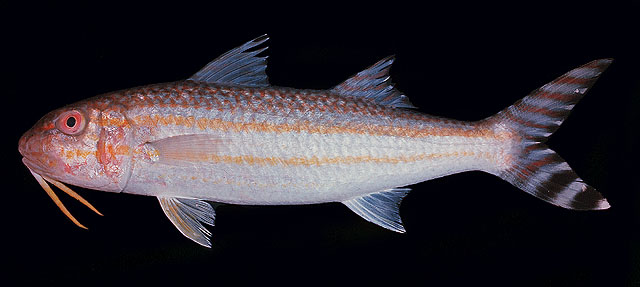| Mullidae (Goatfishes) |
| 33 cm TL (male/unsexed) |
|
reef-associated; marine; depth range 1 - 50 m |
| Indo-Pacific: widespread from between Pinda Bank, Mozambique to Rangiroa I., Tuamoto Archipelago (Fr Polynesia); north to Ishigakijima, Ryukyu Is. (Japan), south to Aitutaki Island, Cook Islands. |
|
Dorsal spines (total): 8-8; Dorsal soft rays (total): 9-9. This species is distinguished by the following characters: D VIII,9; pectoral fins 13-14; gill rakers 5-6 + 16-17 = 21-23; lateral line scales 35-39; body depth at first dorsal fin origin 22-25% SL and at anus 20-23% SL; caudal-peduncle depth 9.7-11% SL; maximum head depth 17-21% SL; head depth through eye 14-17% SL; head length 25-29%SL; orbit length 4.4-6.3% SL; upper jaw length 11-13% SL; barbel length 17-21% SL; caudal-fin length 28-32% SL; anal-fin height 15-17% SL; pelvic-fin length 18-20% SL; pectoral-fin length 17-20% SL; first dorsal-fin height 20-23% SL; second dorsal-fin height 14-16% SL; 9-13 (7-9 in juveniles < 10 cm SL) total bars on caudal fin, 4-8 black bars on upper caudal-fin lobe, the proximal bars slightly curved, 3-6 bars on lower lobe; the bars on both lobe tips black and other bars mostly red or brown becoming black at distal inner margins of lobes (at least the black parts are retained on preserved fish); usually 2 lateral body stripes, one pale brown at mid-body from snout or eye to caudal-fin base, while the other is shorter, fainter, and more yellowish below, from the operculum or behind pectoral-fin base, sometimes a weak third yellow stripe below it (stripes not retained in preserved fish); first dorsal-fin tip pale; yellow barbels when fresh; body pale grey, somewhat darker dorsally, with faint red patches laterally and red scale markings above upper stripe (uniformly pale brown in preserved fish) (Ref. 83903). |
| Inhabits sheltered, often turbid inshore waters over sand or mud substrates; found near corals (Ref. 5213), in very shallow water, usually in small groups (Ref. 9947). Reported to cause hallucinations when eaten (Ref. 4690). |
|
Least Concern (LC); Date assessed: 11 March 2015 Ref. (130435)
|
| reports of ciguatera poisoning |
Source and more info: www.fishbase.org. For personal, classroom, and other internal use only. Not for publication.
